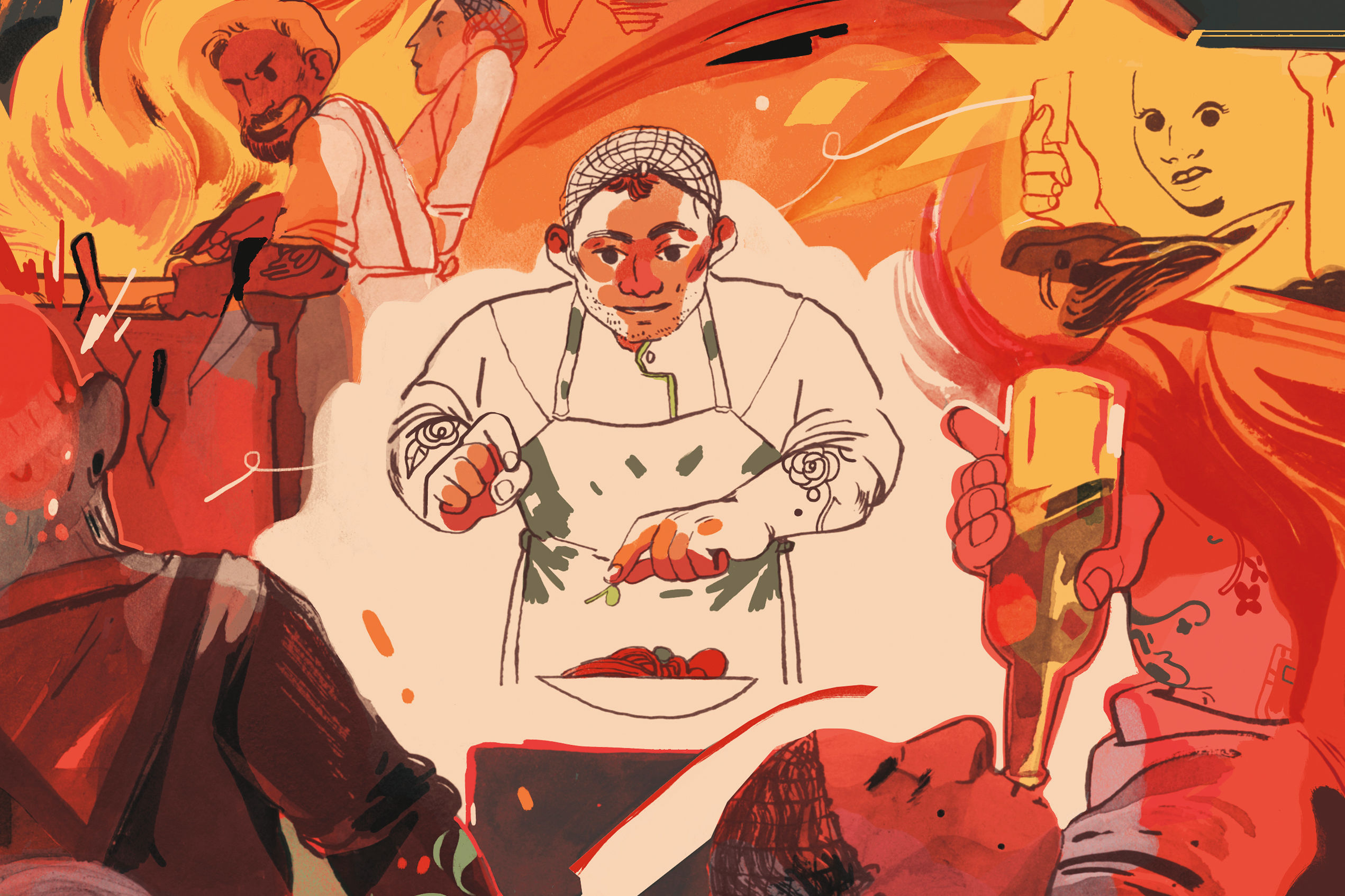How Feast Portland Set The Table for New, Collaborative “Chef Dinners”
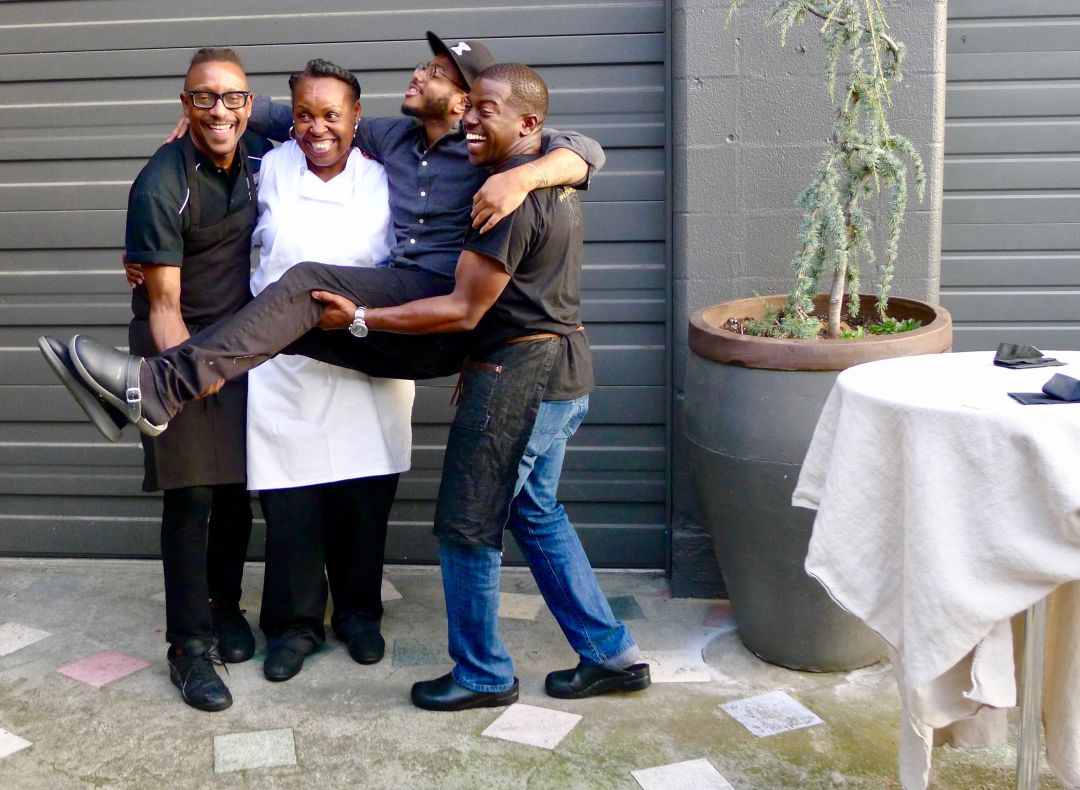
Who had more fun—the diners or the chefs? Gregory Gourdet, Dolester Miles, Kwame Onwuachi, and Edouardo Jordan take a break during their 2019 Feast Portland dinner at the Nightwood, which traced cuisines that originated from the African diaspora.
Image: Karen Brooks
"Hi guys!" T-shirted, tattoo-blazing Gabriel Rucker, the celebrated chef behind Le Pigeon and Canard, stood in front of two communal tables last Friday night at NE Portland’s Nightwood Society. “Let’s get right to the elephant in the room. This meal was made by A.F. …alcoholics free.” A burst of laughter zipped around the room as 72 diners toasted sparkling mango-tea cocktails.
Zero Proof, Feast Portland food festival’s groundbreaking collaborative 2018 dinner, was back: looser, more confident, more committed, and still growing in national clout. Last year’s kick-off dinner was historic, as five of the nation’s top chefs stood together, not as “cool cats” but as humbled sober cooks, bearing witness and testifying to the importance and power of food industry sobriety. Sober chef and TV host Andrew Zimmern whispered to me the corner: “Zero Proof is the most important thing I’ve seen at a food festival in a decade.”
It wasn’t the only special dinner making deep connections in the course of Feast’s annual four-day culinary rampage. The night before, in the same room, four gifted African American chefs came together to create an edible roadmap of the African diaspora, which has not just influenced, but shaped American cuisines, with little acknowledgment until recently. And across town, upstairs at Pok Pok Northwest, two titans of Thai street cooking took us inside their crazy-delicious world while answering, literally and figuratively: why is Thai food so irresistibly gripping? Seven other kinds of dinners also unfolded in different locations.
The coveted Feast dinners, which go for $175–225 a seat and often sell out in minutes, are a centerpiece of Feast Portland, now eight years old and still one of the country’s defining food festivals. Until recently, the serious dinners lured the hippest, hottest young chefs for a night in Portland: a high-end dinner by San Francisco’s Michelin-starred Daniel Patterson and Paris’s neo-bistro prince Iñaki Aizpitarte? Cool, cool, cool. Like the rest of America’s food culture, we were all a bit smitten with star chefs. But the names didn't guarantee actual satisfaction, cohesive menus or, importantly, impactful thinking.
But increasingly, Feast is letting local chefs lead the way and create the narrative, to fascinating effect. “We help chefs use Feast’s platform to tell their story,” says co-founder Mike Thelin. “It’s important to them and to us. We want to be more meaningful, more memorable, and more relevant. These are different times.” It’s an exciting and important new direction—less about Instagramming the dishes than being part of a moment, perhaps something fun or significant, or both.
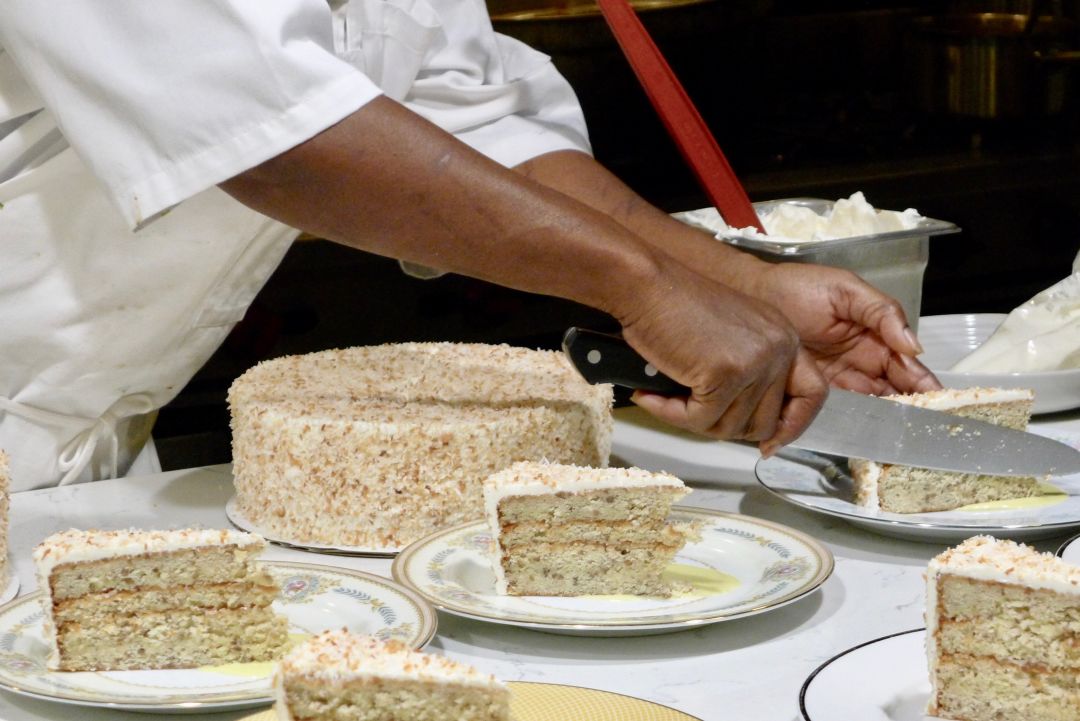
Legendary Alabama pastry chef Dolester Miles makes every slice of coconut-pecan cake count at a collaborative Feast Portland 2019 dinner.
Image: Karen Brooks
Departure chef Gregory Gourdet pitched the African diaspora concept to Thelin and Feast dinner wiz Haehee Joung-Phillips over coffee last year. The idea: Each chef does a course; nothing precious. Says Gourdet: “I wanted to cover different parts of America, different generations and different perspectives of what African American food in America means today. Feast was a tremendous way to do this.”
Mission accomplished. At Thursday night’s dinner, a sense of joy, fellowship, and laughter hung over the room, and it was infectious. That we got to eat some straight up amazing food was a bonus. There was molasses cornbread under a crackling sugar glaze from Edouardo Jordan, who is busy making an indelible mark on American cooking in Seattle at JuneBaby and Salare, via his personal take on Southern food. (He also has two James Beard awards and a smile to rival the sun.) No words exactly capture the stunning cold “soup” of cucumbers, avocados, and gooseberry piri piri from Washington D.C.’s Kwame Onwuachi, the country’s most electrifying young chef. His food and ideas, deeply connected to his roots in Nigeria, New York and Louisiana, will soon be captured in a movie based on his memoir, Notes From A Young Black Chef, starring Lakeith Stanfield (!). (In trying to explain the dish’s 20-ingredient complexity, he just says, "it’s my feng shui.") Gourdet’s super juicy Creole chicken, teeming with Haitian spices, was dispatched with the hot pickled cabbage of his youth. And for all this, the night belonged to towering slices of coconut-pecan cake from the legendary Dolester Miles, who cakes are known to make grown men weep. It took a self-taught pastry chef from Alabama to remind us of how good life could taste.
Meanwhile Rucker, who quietly renounced his hard-partying ways several years ago, brought his big idea to Feast in 2018: Zero Proof. “Portland thinks of itself as countercultural,” he tells me. “But we really haven’t been recently. So I thought, ‘Let’s do something really different. Feast could be the first.”
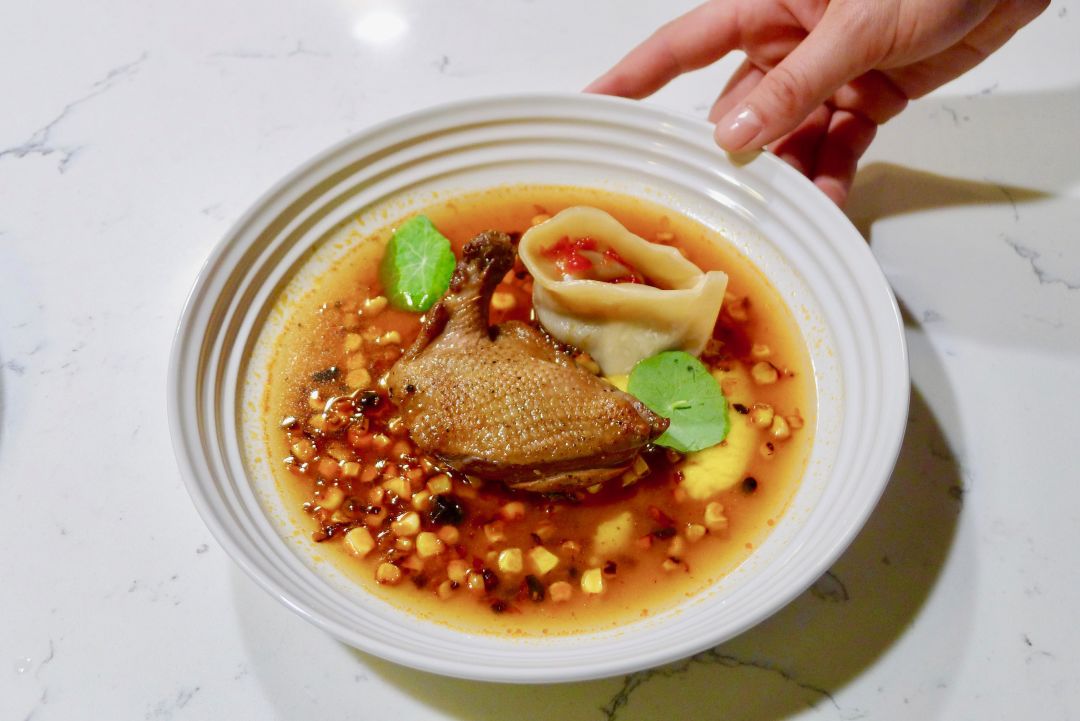
At Zero Proof 2.0 during Feast Portland 2019, chef Gabriel Rucker’s dish of pigeon, foie gras dumplings, and toasted corn broth soared.
Image: Karen Brooks
Now, Zero Proof is the face of a growing movement in which sanity is the new kitchen cool. Rucker says the group is very invested. “We’re moving forward. We want to make this a regular thing, maybe beyond Portland.” This year he brought another sober idea to Feast: healthy “before parties” for the industry, complete with chef runs in Forest Park, in contrast to the late-night, booze-flowing “after parties” Feast is known for.
Still, the question for diners at this year’s sequel: Could Zero Proof v. 2 equal last year’s momentous moment; so raw and emotional that diners ate in near silence, still processing the sentiments? While there was still plenty of inspiring, “we feel blessed and honored” testifying, the room was boisterous this time around, backed by confident, booze-free drinks from sober bartender Eric Nelson, co-owner of Portland’s hot spot Eem. Table talk quickly turned to a chocolate drink of unknown origin. Was it a jacked up Yoo-hoo? “It tastes like Asia,” swooned Malaysian-born diner Pauline Lewis. Turns out the secret ingredients were cashew cream cheese and Lord Bergamot Earl Grey. Who knew? Not us.
The food, surprisingly, was the least interesting aspect of 2018’s Zero Proof, despite the high-powered talent. I mention this to Michael Solomonov, the iconic Israeli modern chef from Philly’s Zahav who cooked both years. “We were all terrified,” he confessed, noting the gravity of the night. This year’s menu? Exceptional. Every dish was strong, from Rucker’s seared pigeon and foie gras dumplings in toasted corn broth to Solomonov’s exacting aged veal, each rosy slice edged with concentrated peaches, salty olives, and near-black chanterelles—a reminder of why Zahav nabbed the coveted James Beard award for America’s most outstanding restaurant. Is there a better testament to being sober?
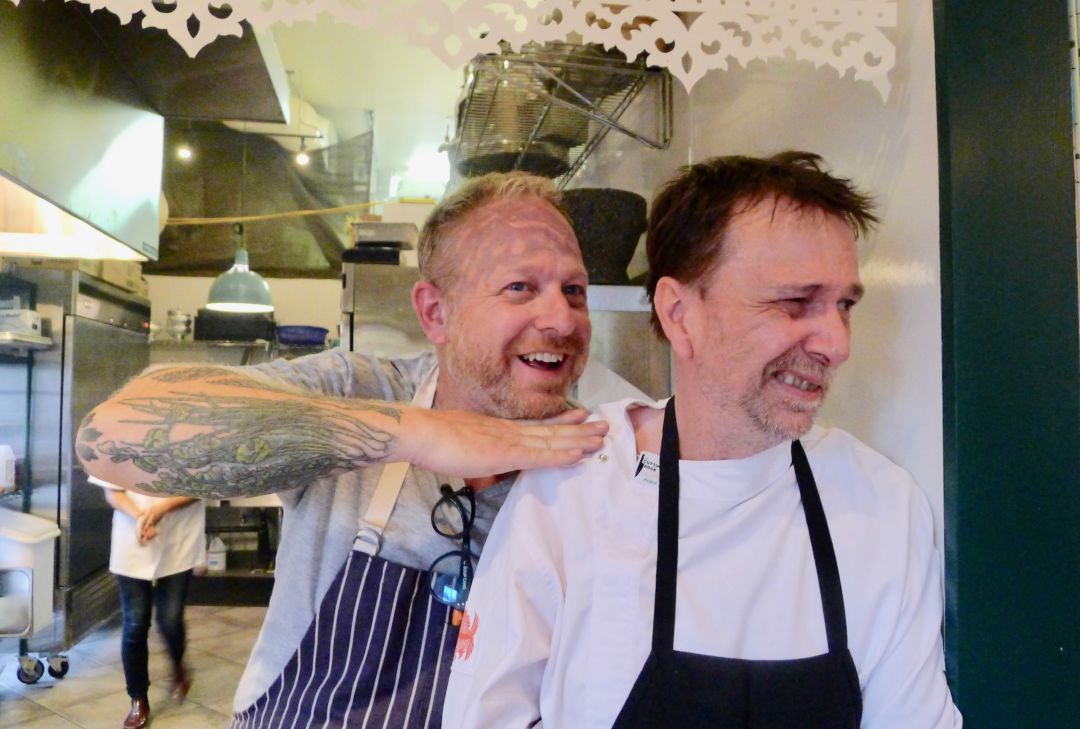
Chef/friends and Thai food devotees Andy Ricker (Pok Pok) and David Thompson (Nahm) charmed with bites and stories at their 2019 Feast Portand dinner.
Image: Karen Brooks
As Feast came to a close on Sunday, 24 souls experienced a different mood altogether, a kind of buddy-cop food movie, as two chef-friend-luminaries sparred, joked and invited us into their wild world of Thai cooking and eating: old school, super-low tech, and everything hand-pounded or grilled over glowing charcoal. For a couple of hours Aussie-born chef David Thompson showed why he is truly one of great students and explicators of Thai food (Nahm, Aaharn), with an assist from Pok Pok's Andy Ricker, the Portlander who once led Anthony Bourdain around Chiang Mai on No Reservations.
“Thai food is so convivial,” says Thompson, “there’s no protocol.” Who could disagree? We were too busy shoving little morsels into our mouth—something that tasted like chewy pork-prawn candy bars melded with palm sugar, crunchy shallots, and deep-fried peanuts, teetering over pieces of pineapple and mandarin orange. The combination, Thompson admitted, sounded preposterous. “It’s the culinary thrill ride I’m addicted to, the tension on the tongue.”
In short: Don’t overthink it. Let the experience unfold. Just grab it and eat the damn thing, as Ricker once put it. The joy is in the journey.
“These stories need to be told,” says Gourdet of Feast’s more personal lineup of dinners. “There is so much happening in food that goes far beyond pleasure.” Feast can be a big part of that. “We are growing,” says Thelin. “We want a real forum, real interaction, real stories, Portland stories. We need to keep looking at what’s really going on in food. If not, what’s the point?"


